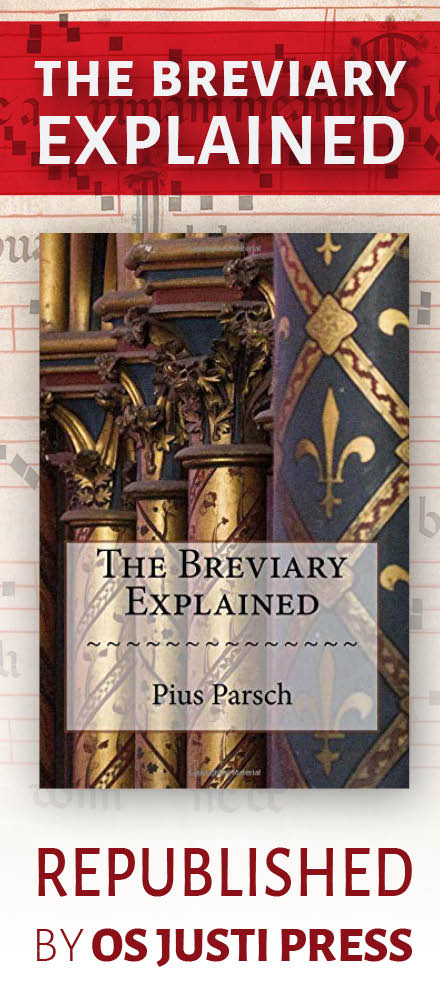The blog of Ignatius Press, Ignatius Insight has a quotation up from Fr. Mitch Pacwa, S.J., who many of you will recognize as a regular speaker on EWTN, and the man who took over Mother Angelica's spot in that network's live, evening call in show.
Fr. Pacwa has spoken in his recently e-letter, "Words of Wisdom", on the conflicts within the liturgy and otherwise these past 40 years:
Some people think that since the Novus Ordo was created, it has been the cause of confusion for Catholics. I do not think that the Novus Ordo is itself the cause of the problem but rather the occasion for the abuses that have occurred. I believe, rather, that the problem began with the priests and religious, plus many lay people, who so accepted the post-war philosophies, especially existentialism and, for some, Marxism, that the Catholic Faith and their commitment to Jesus Christ the Son of God and Redeemer were replaced with a humanistic set of assumptions. The faith needed to be judged by the standards of philosophy rather than judge philosophy by the standards of the Faith. Add to this the social turmoil of the 1960's, when all institutions were treated as suspect, at best. The liturgy became an occasion to express ideology and politics. Furthermore, the teaching of catechism was seriously compromised after 1968, so people were not being taught the Faith. In such a context, everything new seemed to be acceptable, even though the instinct of faith went contrary to the nonsense. The heterodox Catholic progressives had the dynamic force from the 1960's into the 1980's.
That situation is changing, in some ways for the better. The left is aging and has no young followers to push its agenda. The young either become apathetic about a faith emptied of its truth and power through the progressive agenda, or they become orthodox. I describe the heterodox liberals as spiritual geldings and spays; they have removed the essentials of their faith and cannot reproduce, bringing in neither converts nor vocations. The best they can do is make geldings and spays of those who do possess the faith: this is not an appealing prospect for most people.
I am in favor of the restoration of the 1962 liturgy, though I do not intend to celebrate it. I use my talents in the Maronite Mass, where the default language is Aramaic, which I studied in grad school. My Arabic studies are also useful there. However, I promote the Latin Mass because it is an extremely important corrective to the abuses that have been - and still are - foisted upon the people of God in the Novus Ordo. This is not merely a tip of the hat to its inherent beauty, but also to the truths it proclaims in its very nature. I also promote the improvement of the translation of the Novus Ordo. The present translation altered so much - apparently with an ideological purpose - that it becomes easy to miss the proclamations of the Catholic Faith which the liturgy actually proclaims.
Finally, I hope for a full reconciliation among all Catholics who believe the truths of our Faith. The divisions need to end, with a true reconciliation and not with mere capitulation. We need to focus on converting our modern world to Christ, especially the Muslims. God's grace is already operative within Islam, as over ten million Muslims a year become Christian - a first in history. May the dignity and truth of the liturgy be one more of God's tools for this service.
In Christ Jesus,
Fr. Mitch Pacwa, S.J.
A few quick thoughts.
I enjoyed Fr. Pacwa's piece. I would wish to round-out Father's thought by emphasizing that while there is a need to rectify liturgical abuses and the problematic translations, there is also a need for a reform of the reform since the issues and challenges we face in the modern liturgy are not merely with these accidentals but do touch upon the very substance of that missal itself. One can think of the issue of how it was formulated and how much was removed from the older form of the Roman liturgy; the issue of the revisions of the Roman collects that Dr. Lauren Pristas is researching; the issue of how many options are given and even official sanction for ad-libbing in certain parts of the missal, tending toward subjectivity and "creative license"; the looseness of so many of the rubrics -- which can tend toward the same tendency. These and other aspects all touch upon the missal itself, including the Latin editio typica.
This are important matters to not lose sight of, but it should likewise also be noted that I would not want to presume that Fr. Pacwa disagrees with any of this. That isn't really clear to me from the text.
What is clear is that Fr. Pacwa is a very good friend and ally to the cause of a new liturgical movement; one supportive of the need to re-evaluate the way in which the liturgy has been approached these past 40 years and who understands the importance of the usus antiquior in this regard.
He has also hit upon another important theme, one which has certainly been promoted here for some while, which is that there is a need for unity amongst those promoting sound Catholic doctrine and liturgical practice.




















